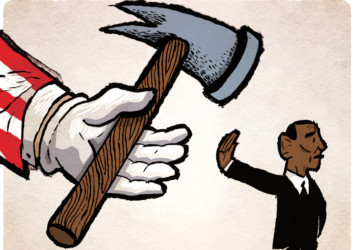
From Charles Krauthammer to Rush Limbaugh, to most of the editorial pages in leading dailies across the US, President Barack Obama received failing grades for his West Point Academy address on May 28, when the most powerful man in the world defended his vision of power. The clarion call was for a solid middle course between isolationism and interventionism that, at least for Obama, lambasted critics who maintained that he gave up on America. Was this an accurate assessment?
To be sure, this American president’s outlook differed from that espoused by his many critics, although his assertion that the question was “not whether America will lead but how we will lead,” underscored why isolationism was not an option. To a certain extent, of course, Obama was right when he declared: “Just because we have the best hammer does not mean that every problem is a nail.” Moreover, and as he reiterated, he was not about to cave in on so many fronts, including negotiations over Iran’s nuclear programme that, apparently, he would not jeopardise. Of course, as the leader of the sole surviving superpower, Obama was preoccupied with several items on his agenda spanning the globe. Washington perceived China as a putative foe and sought to balance its ties accordingly; considered its European partners as potential competitors and worked in earnest to retain its intrinsic advantages; and pigeon-holed a slew of issues under an infinite number of policies that, one hoped, were not contradictory. That was not always the case as recent pronouncements on the post-Arab Spring, and especially with respect to Syria, illustrated.
Be that as it may, what was at stake was American leadership, or lack of it for many detractors, which was why the Chicago Tribune ran an editorial under the title ‘Obama’s empty foreign policy speech at West Point’, while the New York Times concluded that ‘President Obama misses a chance on foreign affairs’.
The president’s supporters, led by CNN’s Farid Zakaria, who believed that “Obama’s leadership [was] right for today”, rushed to his defence. J. Brooks Spector, a former US diplomat who is now a leading commentator, estimated that “Obama’s new foreign policy message [was]: ‘Don’t do stupid’, even if he was.” These cautionary tales were a propos although the West Point vision was hugely uninspiring. While it was useful to be prudent, it was equally valuable to step away from excessive rhetoric, since one did not build a doctrine around platitudes.
In Syria, and this must be acknowledged as truthfully as possible, Obama dropped the baton because the slaughter of more than 150,000 human beings — and still counting — seemed irrelevant to the White House. The president relished the very idea that he steered the US clear of potential dangers, going so far as to decide that Washington had no national security interests there, though what the Syria policy illustrated was a classic example of blatant isolationism.
His “American influence is always stronger when we lead by example,” struck a chord, as Obama’s humble “We can’t exempt ourselves from the rules that apply to everybody else”, missed the point. When Obama declared that “We can’t call on others to make commitments to combat climate change if a whole lot of our political leaders deny that it’s taking place”, the comparison did not cut mustard. The president’s speech writers added to the confusion when they identified concerns about Chinese interventions in the South China Sea and compared them to the delayed ratification by the Congress of the Law of the Sea Convention.
His conclusion that leadership, not retreat, was required in Congress, baffled even more since one was at a loss to see how the non-ratification of a particular treaty was a sign of weakness. Simply stated, one wondered how interventionism on an international treaty compared with the documented isolationism that led to the killings under way in Syria? Such an evaluation was both unfair as well as a grotesque description even for those who thought that “military intervention [was] the only way for America to avoid looking weak”.
At West Point, Obama asked the 1,000 cadets who prepared to join the army’s officer corps why everyone was “so eager to use military force”, even if that was not necessarily the case. He plaintively asked about Ukraine though no American official made such a recommendation. Several contemplated sending military hardware to Ukraine’s woefully equipped forces, but no one called for the deployment of American troops there nor did anyone suggest that Washington put boots on the ground in Syria. Lest we forget, it was President Obama who drew a magical red line last year when he publicly declared that the use of chemical weapons by Damascus would lead to military action. Of course, it was Obama who changed his mind, without providing an adequate explanation for his reticence.
Unwilling to help train and equip the outmanned and outgunned Free Syrian Army, Obama added fuel to the Arab conspiracy theories, which hinted that Washington was involved in a perfect collusion with Moscow to prolong the civil war in Syria for as long as possible. To be sure, not every problem was a nail though Syria was one. In time, Obama may have no choice but to hammer it, although he may well take note that excessive prudence almost always costs more lives than he assumed.
Dr Joseph A. Kechichian is the author of Legal and Political Reforms in Saudi Arabia (London: Routledge, 2013).










